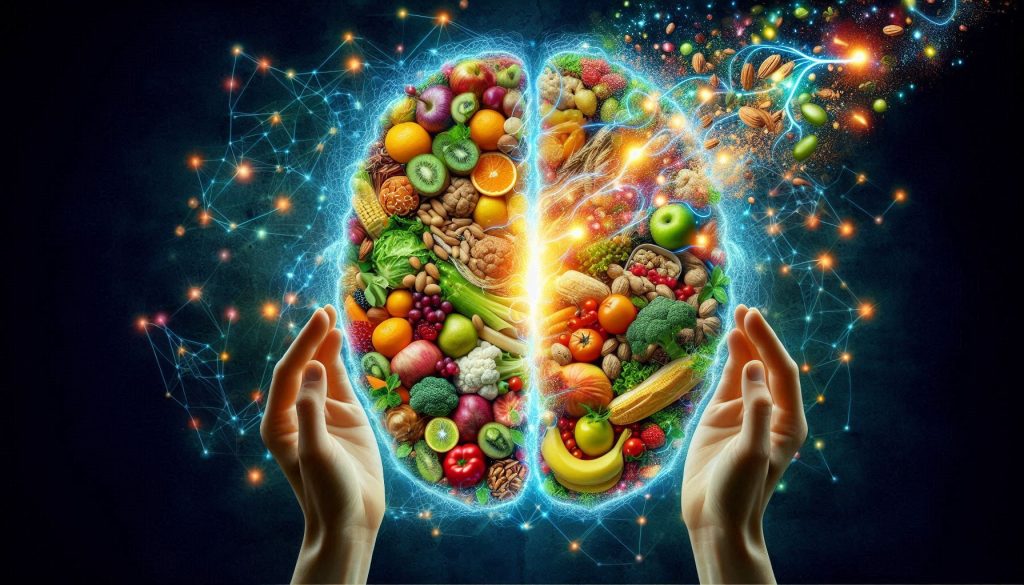Mental health disorders, such as depression, anxiety, and attention-deficit/hyperactivity disorder (ADHD), have become global health concerns, affecting millions of individuals each year. Traditionally, the treatment of these conditions has largely relied on pharmaceuticals, therapy, and behavioral interventions. However, emerging research in the field of nutritional psychiatry suggests that diet and nutrition play an integral role in mental health, offering an alternative or complementary approach to treatment.
Nutritional psychiatry explores how specific foods and nutrients impact brain function, mood regulation, and cognitive processes, making it a promising avenue for the management of mental health disorders. The relationship between diet and mental well-being is complex, yet compelling evidence has emerged those certain dietary patterns, individual nutrients, and gut health can influence conditions such as depression, anxiety, and ADHD.

This article will explore the science behind nutritional psychiatry, examining how specific nutrients and foods contribute to mental health, the mechanisms of action, and how adopting a nutrient-dense, whole-foods-based diet can be used as part of a comprehensive approach to managing mental health disorders.
1. Understanding Nutritional Psychiatry
Nutritional psychiatry is an interdisciplinary field that blends nutrition, psychology, and neuroscience. It seeks to understand the connection between what we eat and how it affects our brain health, emotional state, and cognitive function. The central premise is that mental health is influenced by more than just genetic and environmental factors; it is also heavily shaped by the nutrients we provide to our bodies.
The human brain requires an array of nutrients to function optimally. Just as the body needs vitamins, minerals, and macronutrients (proteins, fats, carbohydrates) to maintain physical health, the brain depends on these nutrients for neurotransmitter synthesis, brain plasticity, energy production, and cellular communication. Imbalances in nutrient intake can have direct consequences on mental health, contributing to the development or exacerbation of conditions such as depression, anxiety, and ADHD.
Nutritional psychiatry is rooted in the understanding that the food we consume affects brain chemistry, hormonal balance, and inflammation, all of which influence mood, cognition, and behavior. As research in this area continues to grow, it is becoming clear that diet can serve as a powerful therapeutic tool, complementing or even replacing traditional pharmacological treatments for mental health disorders.
2. The Gut-Brain Connection: How Food Impacts Mental Health
An exciting area of nutritional psychiatry is the exploration of the gut-brain axis — the bidirectional communication system between the gut and the brain. The gastrointestinal system, often referred to as the “second brain,” contains millions of neurons and produces neurotransmitters such as serotonin, which regulate mood and emotional well-being.
Recent studies have uncovered the profound effect of gut health on mental health, suggesting that a healthy gut micro biome (the community of bacteria and microbes in the digestive tract) is essential for maintaining a balanced mood and cognitive function. Research indicates that an imbalance in the gut micro biota — often caused by poor diet, stress, or antibiotics — can lead to an overgrowth of harmful bacteria, triggering inflammation and altering brain function, which may contribute to conditions like depression, anxiety, and ADHD.
A diet rich in fiber, prebiotics, and probiotics can promote a healthy gut micro biome, supporting mental health. Prebiotics, found in foods such as garlic, onions, and bananas, feed beneficial gut bacteria, while probiotics, found in fermented foods like yogurt, kefir, and kimchee, introduce beneficial bacteria into the gut. These foods help regulate the balance of gut micro biota and can enhance serotonin production, contributing to improved mood and reduced anxiety.
3. Key Nutrients in Nutritional Psychiatry
Certain nutrients have been identified as having significant effects on brain health and the management of mental health conditions. These nutrients are involved in the synthesis of neurotransmitters, regulation of inflammation, and maintenance of brain cell structure. Here, we will explore some of the most critical nutrients that play a role in mental well-being:
3.1 Omega-3 Fatty Acids
Omega-3 fatty acids are essential fats that play a critical role in brain structure and function. They are found in high concentrations in the brain and are involved in the regulation of neurotransmitter systems, such as serotonin and dopamine, which influence mood, cognition, and behavior. Omega-3s are primarily found in fatty fish, such as salmon, mackerel, and sardines, but can also be obtained from plant-based sources like flaxseeds, chia seeds, and walnuts.
Research has shown that omega-3 fatty acids can help manage conditions like depression and anxiety. In fact, several studies have demonstrated that individuals with low omega-3 levels are more likely to suffer from mood disorders. Supplementing with omega-3s has been found to reduce symptoms of depression, enhance mood, and improve cognitive function.
3.2 B Vitamins
The B-vitamin complex, particularly B6, B9 (foliate), and B12, plays an essential role in brain health and the production of neurotransmitters. These vitamins are involved in the synthesis of serotonin, dopamine, and other neurotransmitters that regulate mood and cognition. Deficiencies in B vitamins have been linked to depression, anxiety, and cognitive decline.
Foliate (vitamin B9), in particular, has been extensively studied in relation to mental health. Low levels of foliate have been associated with an increased risk of depression and poor treatment outcomes. B12 deficiency, on the other hand, is often linked to symptoms of fatigue, mood disturbances, and cognitive dysfunction.
Foods rich in B vitamins include leafy greens, legumes, eggs, poultry, dairy, and fortified cereals. Supplementing with B vitamins has been shown to improve mood and reduce symptoms of depression and anxiety, especially when levels are low.
3.3 Magnesium
Magnesium is a mineral involved in over 300 enzymatic reactions in the body, including those that regulate mood and cognitive function. It plays a crucial role in the regulation of neurotransmitters like serotonin, which help maintain emotional stability. Magnesium has a calming effect on the nervous system and is often referred to as “nature’s tranquilizer.”
Low magnesium levels have been associated with conditions such as depression, anxiety, and insomnia. In clinical studies, magnesium supplementation has been shown to alleviate symptoms of anxiety and depression, particularly in individuals with deficiencies.
Magnesium-rich foods include leafy green vegetables, nuts, seeds, whole grains, and legumes. Ensuring adequate magnesium intake through diet or supplementation can have a significant positive effect on mental health.
3.4 Vitamin D
Vitamin D, often referred to as the “sunshine vitamin,” is essential for brain function and the regulation of mood. It is involved in the synthesis of serotonin and has anti-inflammatory properties that may help prevent mood disorders. Research has shown that individuals with low vitamin D levels are at a higher risk of developing depression, anxiety, and other mood disorders.
Vitamin D is primarily obtained through exposure to sunlight, but it can also be found in fortified foods like dairy products and cereals, as well as in fatty fish like salmon and mackerel. Supplementing with vitamin D has been shown to improve symptoms of depression, particularly in individuals with low blood levels of the vitamin.
3.5 Zinc
Zinc is a trace mineral that is essential for immune function, wound healing, and protein synthesis. It also plays a critical role in brain function, including neurotransmitter regulation and the modulation of brain plasticity. Zinc deficiency has been linked to a range of mental health issues, including depression, anxiety, and ADHD.
Research indicates that zinc supplementation can improve mood and reduce symptoms of depression and anxiety, particularly when zinc levels are low. Foods rich in zinc include meat, shellfish, legumes, seeds, nuts, and dairy products.
4. The Role of Diet in Managing Depression and Anxiety
4.1 Dietary Patterns and Depression
The foods we eat can significantly impact our risk for depression. Studies have shown that diets rich in whole foods, such as fruits, vegetables, lean proteins, whole grains, and healthy fats, are associated with a lower risk of depression. On the other hand, diets high in processed foods, refined sugars, and unhealthy fats have been linked to an increased risk of depression.
A Mediterranean diet, which emphasizes fruits, vegetables, fish, olive oil, and whole grains, has been shown to reduce the risk of depression and anxiety. This dietary pattern is rich in omega-3 fatty acids, antioxidants, and fiber, all of which promote brain health and reduce inflammation.
4.2 Inflammation and Depression
Chronic inflammation is increasingly recognized as a key factor in the development and exacerbation of depression. Poor dietary habits, particularly the consumption of processed foods and sugars, can trigger inflammation in the body, which in turn affects brain function and mood regulation.
Adopting an anti-inflammatory diet, rich in omega-3s, antioxidants, and fiber, can help reduce inflammation and improve symptoms of depression and anxiety. Foods like fatty fish, berries, leafy greens, nuts, and seeds are known to have powerful anti-inflammatory properties.
5. Managing ADHD through Nutrition
Attention-deficit/hyperactivity disorder (ADHD) is another mental health condition that can benefit from dietary interventions. Research suggests that children and adults with ADHD may have deficiencies in certain nutrients, including omega-3 fatty acids, iron, zinc, and magnesium. Addressing these deficiencies through diet and supplementation can help improve symptoms of ADHD.
In addition to nutrient-rich foods, it is important to limit the intake of sugar and refined carbohydrates, which can exacerbate symptoms of hyperactivity and inattention. A balanced, whole-foods-based diet that includes protein, fiber, and healthy fats can help regulate blood sugar levels and improve focus and concentration.
6. Practical Tips for Incorporating Nutritional Psychiatry into Daily Life
- Eat a balanced, nutrient-dense diet: Focus on whole foods, including fruits, vegetables, lean proteins, healthy fats, and whole grains.
- Include omega-3-rich foods: Add fatty fish like salmon, mackerel, and sardines to your diet, or include plant-based sources like flaxseeds and walnuts.
- Prioritize gut health: Consume fermented foods, prebiotics, and fiber to support a healthy gut micro biome.
- Consider supplementation: If necessary, supplement with nutrients such as omega-3s, B vitamins, magnesium, and vitamin D, but always consult a healthcare provider before starting any supplementation.
- Limit processed foods: Reduce the intake of processed, sugary foods and refined carbohydrates, which can trigger inflammation and negatively affect mood.
- Stay hydrated: Drink plenty of water, as dehydration can affect cognitive function and mood.
Conclusion
Nutritional psychiatry offers a promising approach to mental health management by emphasizing the role of diet and nutrients in brain function and emotional well-being. Emerging research suggests that specific foods and nutrients can help manage and even prevent mental health disorders like depression, anxiety, and ADHD. By incorporating a balanced, nutrient-dense diet and addressing nutrient deficiencies, individuals can support their mental health and enhance their overall quality of life.
As the field of nutritional psychiatry continues to evolve, it is crucial to recognize the profound impact that food can have on our mental health. With more research and greater public awareness, nutrition may become an essential pillar in the comprehensive treatment of mental health disorders, offering a holistic and effective approach to emotional and cognitive well-being.
SOURCES
Firestorm, J.D. (2012). “Tryptophan, Serotonin, and the Brain: Impact on Human Behavior.” Journal of Nutrition, 142(2): 251S-257S.
Micah, R., Penal, J.L., Cudlee, F., & Rahm, C.D. (2017). “Association between Dietary Factors and Mortality from Heart Disease, Stroke, and Type 2 Diabetes in the United States.” JAMA, 317(9): 912-924.
Bark, M., Williams, L.J., & Jackal, F.N. (2013). “Nutrition and Mental Health: A Review of the Evidence.” Act Psychiatric Scandinavia, 128(4): 318-328.
Hussein, M., & O’Neill, C. (2018). “Serotonin and the Gut-Brain Axis.” Frontiers in Neuroscience, 12: 708.
Müller, M., & Posada, S. (2019). “The Influence of Diet on Mental Health: Evidence from Recent Studies.” Frontiers in Psychology, 10: 2031.
O’Neill, M., & Hansel, A. (2016). “Impact of Dietary Tryptophan on Serotonin Synthesis and Mood Regulation.” The British Journal of Nutrition, 115(8): 1376-1383.
Chavez, M., & Sprig, M. (2017). “Probiotics and Gut Health: Implications for Mental Health.” Nutritional Neuroscience, 20(2): 118-124.
Hammer, M., Stamatas’s, E., & Steptoe, A. (2014). “Dietary Patterns and Serum Cholesterol: Effects on Cardiovascular Risk and Mental Health.” European Journal of Clinical Nutrition, 68(3): 376-382.
Gibson, E.L., & Green, M.W. (2018). “Dietary Modulation of Serotonin and Its Impact on Cognitive and Emotional Functions.” Current Opinion in Clinical Nutrition & Metabolic Care, 21(6): 472-478.
Sarris, J., & Mischoulon, D. (2018). “Nutritional Psychiatry: An Overview of the Role of Diet in the Treatment of Mental Disorders.” Act Psychiatric Scandinavia, 137(4): 312-318.
Baker, M., & Roberts, S. (2015). “The Role of Gut Micro biota in Serotonin Regulation and Mental Health.” Microorganisms, 3(3): 293-310.
Ki colt-Glaser, J.K., & Glaser, R. (2017). “Stress, Inflammation, and Health: A Review of the Psychoneuroimmunology of Aging.” Aging & Disease, 8(5): 693-709.
Lai, J.S., & Hales, S.A. (2013). “The Role of Omega-3 Fatty Acids in Mental Health: A Systematic Review of the Literature.” Journal of Clinical Psychiatry, 74(8): 810-818.
Jackson, R. (2019). “The Impact of Diet on Gut Micro biota and Mental Health.” Nutritional Neuroscience, 22(6): 391-398.
Medeiros, A.L., & Britton, L.R.G. (2015). “Magnesium and Serotonin: A Critical Review of Magnesium’s Role in Mood Disorders.” Magnesium Research, 28(1): 1-12.
Sullivan, M.J., & Levin, L. (2016). “Dietary Strategies for Managing Serotonin Levels: The Link to Mental Health.” American Journal of Clinical Nutrition, 104(2): 417-428.
Ensley, R., & Chalaza, B. (2017). “The Impact of Probiotics on Mental Health: A Comprehensive Review.” Psychiatry Research, 254: 287-294.
O’Neil, M., & Hansel, A. (2017). “Dietary Tryptophan: A Natural Solution for Optimizing Serotonin Levels.” Journal of Clinical Psychopharmacology, 37(3): 223-229.
Rogers, P.J., & Morgan, S. (2016). “Carbohydrates and Serotonin: Effects on Mental Performance and Mood.” Current Opinion in Clinical Nutrition & Metabolic Care, 19(3): 265-271.
Spector, T.D., & Gee sink, P. (2019). “Gut Micro biome and Its Influence on Brain Function and Mood.” Brain, Behavior, and Immunity, 82: 133-142.
HISTORY
Current Version
April 12, 2025
Written By:
ASIFA



0 Comments